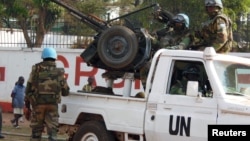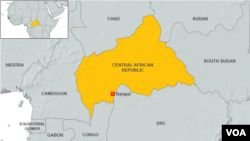Human rights group Amnesty International says more needs to be done to strengthen the U.N. mission in the Central African Republic, MINUSCA. In a new report, Amnesty argues weaknesses within the mission were exposed during violence last September. MINUSCA says it has learned from that experience.
Amnesty’s report pays tribute to MINUSCA forces who it says have saved many lives, helped prevent the Central African Republic from escalating further and often displayed bravery at significant cost.
But it says gaps in their capacity were cruelly exposed during three days of armed group violence in September when 75 civilians were killed in the capital, Bangui.
Amnesty researchers say MINUSCA’s 2,660 soldiers and police in Bangui were almost entirely absent from key areas of this conflict until late afternoon on the 27th, and were unable to help transfer badly wounded people to hospitals.
The report finds that since then the mission has performed better, but that key weaknesses remain. These include lack of armored personnel carriers, lack of intelligence gathering capacity, and poor motivation of some units, particularly some that have not been paid their full U.N. salaries.
Commenting on the report Wednesday, MINUSCA spokesman Vladimir Monteiro said the U.N. High Commission for Human Rights also raised concerns about MINUSCA’s late reaction to the events in September.
“We welcome this report,” said Monteiro, “because it helps us see things more clearly; at the same time it confirms that MINUSCA’s intervention has saved lives.”
The mission has learned lessons and taken steps since then, he added.
“One of the main steps taken,” he said, was to set up a joint task force for Bangui, which has produced results with MINUSCA’s operation Free Movement, so that today people can move freely to and from the PK5 district.”
PK5 is Bangui's lone remaining Muslim community and has been the main flashpoint in the capital.
Speaking on condition of anonymity, a MINUSCA insider told VOA that many criticisms in the report are not really of the United Nations, but of countries involved with the mission.
Some governments do not pay their men their full U.N. salaries, and do not have the means or the political will to move assets like armored vehicles out of the home country, he said.
MINUSCA will guard for any unrest as the CAR holds a presidential run-off vote this Sunday.





